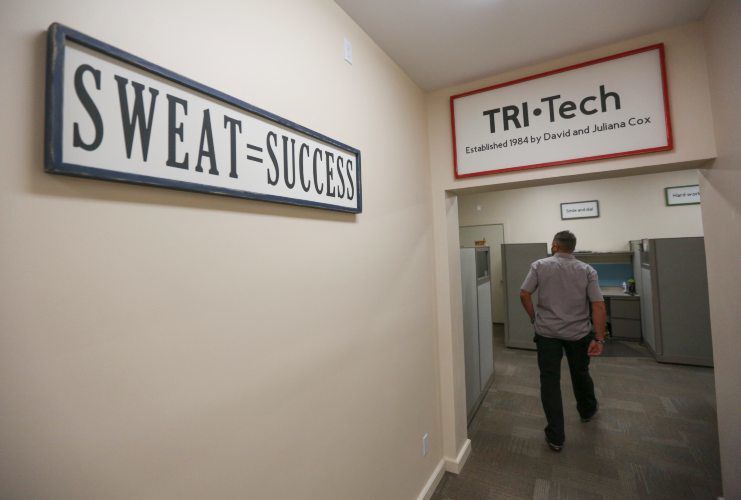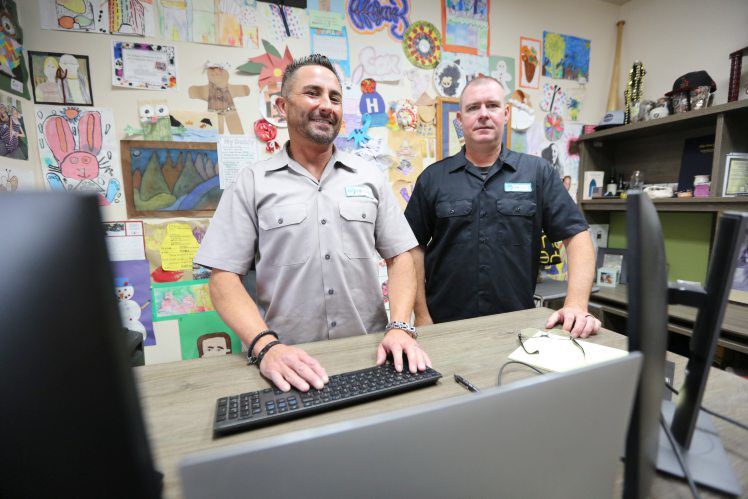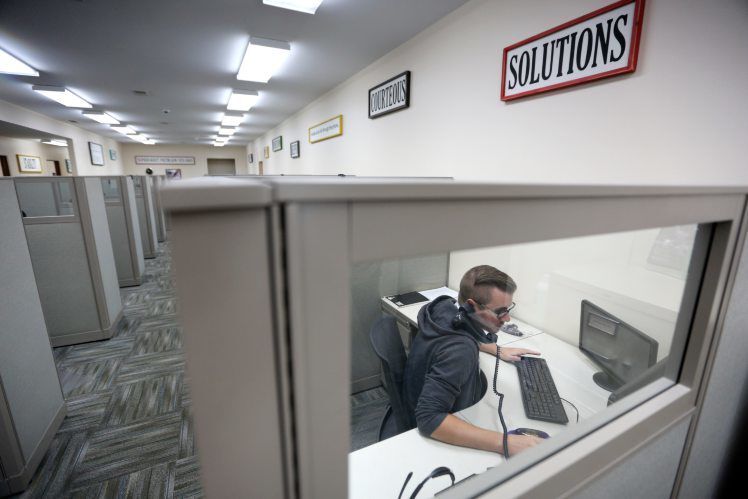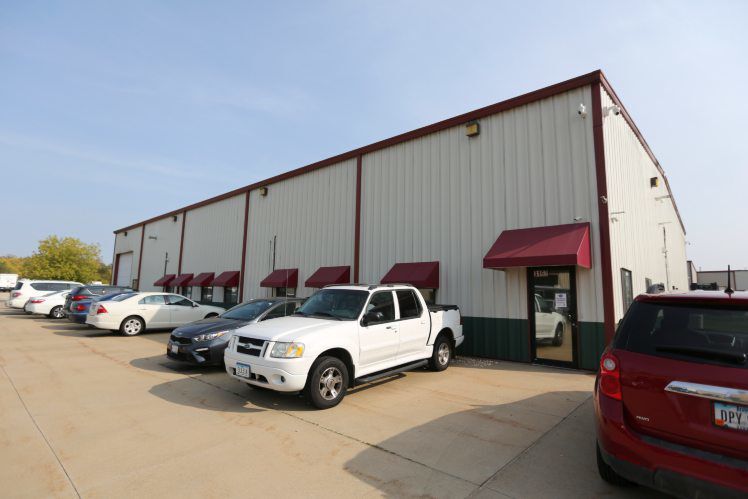Behind the scenes of almost every purchase is a sophisticated system, called point-of-sale, that facilitates transactions for retailers and consumers. Pam Lewey depends on it for her business, The Bike Shack, in Dubuque.
“We use a set program where we can pick and choose features,” said Lewey, general manager. “We put in our inventory and then there are sections of the POS system that are incredibly useful for our particular operation.”
Since 2000, The Bike Shack has used a POS product from Tri-Tech Systems, a Dubuque company that provides software and other technology solutions for specialty retailers. Tri-Tech has served businesses for more than 30 years.
“The best part of working with Tri-Tech is that everything we need comes in one package. Their AIM system saves our purchasing history, helps manage accounting and much more,” Lewey said.
Dave Cox founded Tri-Tech while living in California, and he serves as chief financial officer. His son, Greg Cox, is a partner and is chief operating officer.
Regarding his father, Cox said, “He wanted to create a software program for a niche market. He knew some people that owned music stores and saw the current solutions did not handle everything these retailers do, like student rentals and lessons.”
So, the senior Cox developed a POS system. According to the U.S. Small Business Administration, a basic POS system is “a place where retail transactions are made.” However, present-day systems, including those from Tri-Tech, do more than managing sale transactions.
“Throughout the years, more features have been added, and we started branching out to several other retail markets,” Greg Cox said. “Currently, our primary markets are music, bike, sports/fitness, vacuum/sewing and gun retailers; however, we have other types, too.”
The company moved to Dubuque, the Cox family hometown, in 1990. Greg graduated from Wahlert Catholic High School in 1993 and has worked with his father since.
He has held various positions and considers his father a mentor. During his career at Tri-Tech,Greg has watched the company respond to changes in the field and grow — all while staying flexible to client needs.
“Our software handles everything the off-the-shelf POS systems (do) … also handling several things those packages don’t, such as long- and short-term rentals, repair and services, lessons and scheduling or range reservations,” Greg said.
At The Bike Shack, their POS records, stores and analyzes data — providing faster, comprehensive information management to help the store understand purchasing patterns and better meet consumer interests.
The store’s AIM system, which stands for Accounting Inventory Management, is the name of Tri-Tech’s primary POS and retail management product. This system offers a variety of features, customizable for each specialty retailer.
“We also have e-commerce solutions that interface directly with AIM,” Greg said. “Several years ago, we purchased a local software company called PC Poll that has software that polls data from cash registers. They sold products through re-sellers, so that opened opportunities for those re-sellers to sell our products.”
Tri-Tech’s second partner and chief executive officer, Paul Acton, agreed that Tri-Tech’s ability to adapt while addressing client requirements is its greatest asset.
“With so many clients using our software across multiple verticals, it’s enjoyable to work on projects that will better serve customers whether it’s a more efficient way our software can handle real world problems, or new modules, or ways to attack problems based on newer and ever changing technologies,” Acton said.
That works for The Bike Shack.
“Access to their tech support is great. Tri-Tech can resolve any problem, even the bugs we bring to their attention. They also are our IT department and help with computer issues and regular maintenance,” Lewey said.
To create this seamless system for clients, Tri-Tech has to keep pace with changing technology.
“To give our customers a cutting-edge system, (leadership) does a great job of staying abreast of the newest technology and orchestrating our team in what and when to implement,” Greg said. “Changing the structure of a system that is as robust as ours, with millions of lines of code, is not an easy task.”
Acton fully embraces that imperative. After the Cox family relocated Tri-Tech to Dubuque, Acton was a senior at Clarke University and worked at the Toll Bridge Inn. Through a mutual friend, he learned the company was seeking a software developer.
Once hired, Acton said, “The company consisted of just Dave and myself with under 100 clients, all in the music industry. Today, we employ right under 50 employees, with thousands of clients across many vertical markets.”
Tri-Tech continues to maintain a family business model. Greg’s wife and two sons are full-time employees, and two daughters work there part-time.
“I really like working internally with our team,” Greg said. “We take pride in the fact that we have a very low turnover rate with employees and several have been here for 20-plus years.”
The company has been located on Cedar Crest Drive since 2000. Cox, Acton and others did the construction on the original building, with an expanded warehouse added in recent years.
“We have our complete operation with all departments under one roof,” Acton said. “That includes development, sales and support departments. We can just walk from one department to the other to get questions answered and resolve any issues that might arise for a customer quickly and correctly with minimal delay. While I do wish I still had the time to do actual coding, I enjoy heading up the development team and our development efforts.”
Close working quarters temporarily ended once COVID-19 hit. Acton and Greg had to rethink Tri-Tech’s business model, for their onsite employees as well as responding to unprecedented circumstances for their clients.
“We decided early on to purchase a bunch of laptops, webcams, headphones and software to help us in the event we needed to all work from home,” Acton said. “There was a time that we had about 75% of our workforce working from home.”
Even as a technology company, the two partners discovered new ways to conduct business processes, increasing their use of online platforms, video meetings, shared calendars and more to continue getting work accomplished.
The pandemic ushered in unknowns for specialty retail clients, some of which temporarily closed and others that are struggling to bring up the level of sales compared to prior to the crisis.
“We have monthly maintenance plans that our customers pay for, and we did not know how many would be canceling with their stores being closed,” Greg said. “Most of our sales come from cold calls or trade shows, so that presented challenges for our team.”
Today most of the company’s staff have returned to the office. In addition, Greg said it was fortunate that most retail clients have continued their contracts for services.
“Our sales team kept pushing and kept finding new customers to add. The ability for our whole company to be able to adjust and adapt and keep pushing gives us great pride in the team we have here,” Greg said.
The company is looking forward to the end of COVID-19 and the ability return to in-person meetings and events. Also, they soon will release an app allowing clients to directly interface with Tri-Tech’s database. This will help retailers use POS features in a new app format.
Lewey said her store will continue to rely on evolving technology from Tri-Tech with service vital to The Bike Shack’s success.
“Being local, I can go there easily to buy supplies like labels or quickly discuss tech needs. They even help us with marketing promos. I can’t think of anything we need that they don’t do.”





